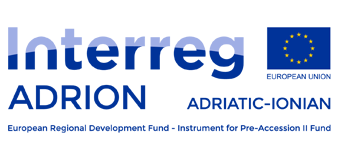Interreg IPA ADRION 2021-2027
The Interreg IPA ADRION Programme (2021-2027) has been approved on 30th November. A big thanks to all the institutions, organisations and people who have worked hard for the adoption of the Programme. We are starting a new journey together.
IPA ADRION acts as policy driver and governance innovator fostering European integration among Partner States, taking advantage of the rich natural, cultural and human resources surrounding the Adriatic and Ionian Seas and enhancing economic, social and territorial cohesion in the Programme area.
Expected impacts
- Development of a regional innovation system for the Adriatic-Ionian area
- Enhanced capacity to transnationally tackle environmental vulnerability, fragmentation and the safeguarding of ecosystem services in the Adriatic and Ionian area.
- Enhanced capacity for integrated transport and mobility services and multi-modality in the Adriatic-Ionian area
- Enhanced institutional capacity of public administrations and key stakeholders, and assist the progress of implementation of joint priorities in the framework of the EUSAIR.

FRAMEWORK OF INTERREG IPA ADRION
ADRION Policy and Specific Objectives:
- Supporting a smarter Adriatic-Ionian region (PO 1)
- Developing and enhancing research and innovation capacities and the uptake of advanced technologies
- Developing skills for smart specialisation, industrial transition and entrepreneurship
- Supporting a greener and climate resilient Adriatic-Ionian region (PO 2)
- Promoting climate change adaptation and disaster risk prevention, and resilience, taking into account eco-system based approaches
- Promoting the transition to a circular and resource efficient economy
- Enhancing protection and preservation of nature, biodiversity and green infrastructure, including in urban areas, and reducing all forms of pollution
- Promoting sustainable multimodal urban mobility, as part of transition to a net zero carbon economy
- Supporting a carbon neutral and better connected Adriatic and Ionian region (PO 3)
- Developing and enhancing sustainable, climate resilient, intelligent and intermodal national, regional and local mobility, including improved access to TEN-T and cross-border mobility
- Supporting the Governance of the Adriatic-Ionian region
ADRION current programming period will be officially over in 2020. What does it come next?
Although, the future of the Programme is part of a negotiating process among concerned bodies (EC; European Parliament; the European Council; Committee of the Regions, etc.), a taskforce has been set up at Programme level in order to discuss with our Partner States the areas and topics of the new ADRION and the ways to involve Programme stakeholders through public consultations. The taskforce ensured the release of the territorial analysis which aims at providing useful insights on the future needs of the Programme. The taskforce has been convening regularly since 2019.
These meetings advanced in parallel with the EU-level negotiations on the budgetary and regulatory framework. In this regard, the European Commission presented in 2019 its Orientation Paper on ADRION, a document aimed at triggering a discussion on the future Programme with Partner States concerned. The paper highlighted some important points:
- The future Adriatic-Ionian programme should closely link with the EUSAIR priorities and objectives
- For transnational cooperation is paramount to address joint challenges in areas, known well as “functional areas” which have joint characteristics. Transnational cooperation is reaching its full potential when there is a strong will to address those challenges jointly
- The programme should concentrate on thematic key areas where joint actions can have the biggest impact. In doing so, EU funds would focus on a limited set of objectives and policy areas, thus achieving the highest possible impact, in terms of efficiency of funding and result orientation.
ADRION Territorial Analysis
In July 2020 the territorial analyisis commissioned by the Programme depicted the challenges well as strong points of the area. According to the analysis, the Adriatic-Ionian region stands out as a diverse and multifaced area with great potential as well as lots of disparities. Internal inqualities within the area have been detected as one of the aspects that are needed to be fully addressed. The territorial analysis highlighted some important key messages that could improve the quality of life of the citizens living in the area as well as increase its economic growth:
- the cities are to be considered as hubs for innovation and growth
- investments on R&D are crucial for the development of innovative services
- upskilling and re-skilling of the working force help reduce job mismatched
- youth unemployment and ageing population are area’s main social weaknesses
- digitalisation can help increase the economic income of some sectors, like tourism
The territorial analysis underlined an important factor which is globally relevant and particularly in the Adriatic-Ionian area, where natural resources are overexploited and renewable energies can play an important role: the focus on the protection of biodiversity and nature conservation. The analysis highlights the need for:
- decarbonisation
- switch to renewable energy sources
Given the fact that the ADRION region has great potential for the development of renewable energy sources such as solar and wind energy, it performs below the EU average as for eco-innovation and energy efficiency.
Public&Stakeholder consultations
A public and stakeholders’ consultation was organised in order to receive feedback from citizens, as well as Programme stakeholders on the relevance of the Policy Objective preliminary identified by the Task Force for ADRION post 2020.
Stakeholders events were also organised in order to raise the discussion on ADRION post-2020 and ease the compilation of the stakeholders survey targeted to experts involved in each specific Priority Objective (PO). These informative events took place as follows:
28th October 2020 for PO 3 – online
4th November 2020 for PO 2 – online
12th November 2020 for PO 1 – online
Screening ambientale IPA ADRION


